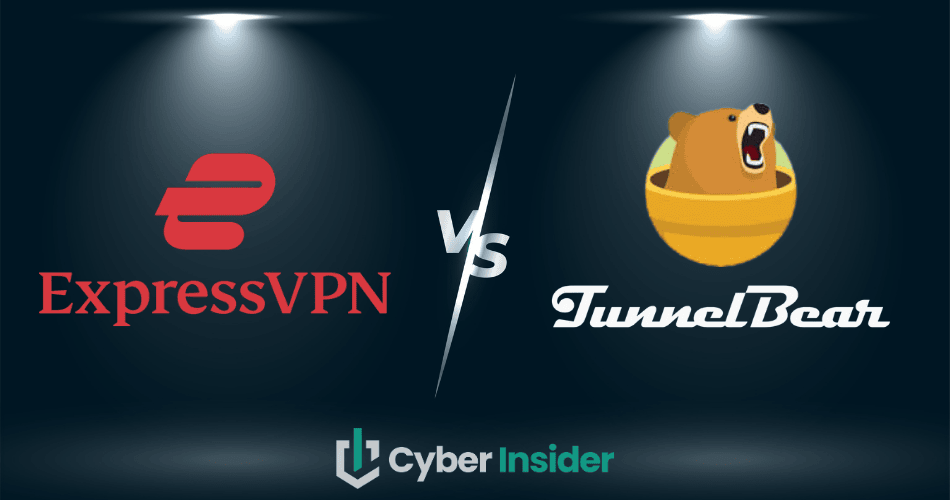
ExpressVPN and TunnelBear are both big names in the VPN industry, with a history that goes back many years. So how do you choose between these two VPN services? This comparison of the two services will answer all of your questions as we take a deep dive into eight different categories.
Based on the latest test results, ExpressVPN is the overall winner for 2025. In comparison to TunnelBear, ExpressVPN delivers faster speeds, better apps, more security features, a larger server network, and much better support for streaming services (Netflix, Amazon Prime, and more). While ExpressVPN is a bit more expensive than TunnelBear, you can use the coupon in the table below for four months free.
This table highlights the main facts about each VPN:
| ExpressVPN | TunnelBear | |
| Website | ExpressVPN.com | Tunnelbear.com |
| Location | British Virgin Islands | Canada |
| Servers | 3,000+ | 84+ |
| Countries | 94 | 47 |
| Logs | No logs (audited) | Connection logs |
| Torrenting | All servers | Restricted |
| Support | Knowledge Base; 24/7 live chat | Knowledge Base; email (no chat) |
| Apps for | Windows, macOS, Linux, Android, iOS | Windows, macOS, Android, iOS |
| Price | $4.99 | $3.33 |
| Coupon | 61% Off + 4 Months Free > | N/A |
ExpressVPN is one of the best-known names in the VPN world. Polished, easy to use, and reliable, it has long been considered one of the best VPN services around. It is widely recommended to anyone looking for a strong Virtual Private Network (VPN).
TunnelBear VPN is also well-known, with frequent recommendations. The service does have some strengths, including solid security, a couple of third-party audits, ease of use, and a fun, bear-themed design. But as you'll see with the test results below, only one of these VPNs is worth considering.
In this article, we'll show you who came out on top in the TunnelBear vs ExpressVPN shootout. Here are the eight categories we'll examine:
- Company background and jurisdiction
- Features
- Speed tests
- Streaming and torrenting
- Encryption, VPN protocols, and security
- Privacy
- Prices and refunds
- Value
- Conclusion and final recommendations
By the time we get through these tests, it will be obvious which VPN is best.
Company background and jurisdiction
VPNs protect us from the prying eyes of everyone from our ISPs to major corporations and various intelligence-gathering outfits. However, because we are entrusting the VPN with all of our internet traffic, it's crucial to research the reputation of the company itself.
And because every company has a home jurisdiction whose laws the company must obey, it is important to know where a VPN is located. Not all countries respect the privacy of foreigners, or even of their own citizens.
We checked out these two services. This is what we learned.
ExpressVPN background and jurisdiction
| Website | ExpressVPN.com |
| Based in | British Virgin Islands |
| Logs | No logs (audited) |
| Price | $4.99/mo. |
| Support | 24/7 live chat |
| Refund | 30 days |
| Deal | 61% Off Coupon |

Unlike some VPNs that have endured controversy over the years, ExpressVPN has a pretty clean background. It has been operating for many years as a safe, reliable, and trustworthy VPN service. Also bolstering the points for trust is the fact that ExpressVPN has passed numerous third-party audits. We'll discuss these more below.
One recent development, however, is how Kape Technologies acquired ExpressVPN. While we're not big fans of this acquisition, ExpressVPN will continue to operate independently. Kape is a global company that is headquartered in London.
ExpressVPN is based in the British Virgin Islands (BVI). The BVI is a good jurisdiction for a VPN. They are not a member of any international surveillance alliances. The BVI also does not have any mandatory data retention laws that would prevent a company from honoring its no-logs policy.
With the BVI being an independent legal and political entity, it remains a strong jurisdiction for privacy-focused VPNs. And we also see other VPNs incorporating there, which we noted in our Surfshark review.
TunnelBear background and jurisdiction
| VPN | TunnelBear |
| Based in | Canada |
| Logs | Connection logs |
| Price | $3.33/mo. |
| Support | |
| Refund | None |
| Website | TunnelBear.com |
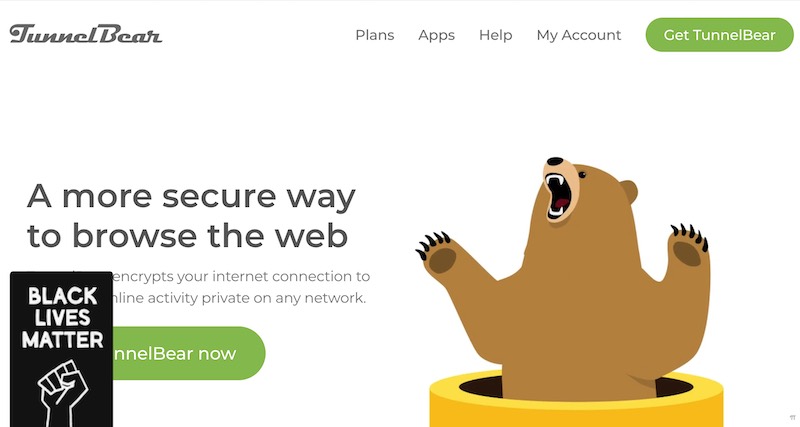
TunnelBear started out as an independent entity, but then they were acquired by McAfee in 2018. McAfee is a US cybersecurity firm legally based in the United States. US law allows the government to force companies to spy on their users. We discuss this disturbing fact in our IPVanish review, where IPVanish was forced to log its users at the behest of the FBI. Additionally, the US is the leader of the Five Eyes international surveillance alliance. All in all, a United States company is not a great choice for protecting your privacy.
The VPN itself, however, is technically based in Canada, where it legally operates. Canada is also a member of the Five Eyes alliance and has a dubious record of respecting user privacy. (This is one reason to avoid Canada VPN services.)
We strongly urge VPN users to choose a service based outside the United States or Canada. Given that, this category easily goes to the guys based in the British Virgin Islands.
Company background and jurisdiction winner: ExpressVPN
TunnelBear vs ExpressVPN features comparison
In this category, we take a broader look at each VPN, in general, to see which has the stronger feature set overall.
TunnelBear features
TunnelBear is clearly designed to be accessible and user-friendly for regular folks. The service features simple apps for Windows, Mac OS, Android, and iOS devices. They also offer useful browser extensions, if you need a VPN for Chrome or Firefox. Here was the TunnelBear Windows client we tested:
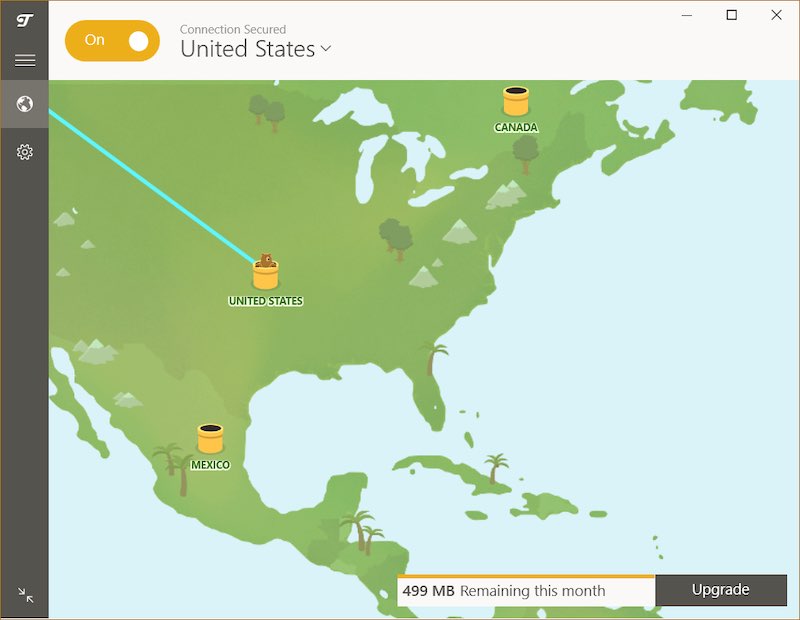
Limited apps – TunnelBear is also somewhat limited when it comes to VPN apps. For example, they do not offer any support for routers. Additionally, TunnelBear only offers limited support for Linux. There are also other devices, such as Android TVs, which are not supported by TunnelBear. And if you need a VPN for gaming, you are also out of luck:

TunnelBear VPN apps look good, but they had some problems in our tests. Specifically, we saw random connection problems when trying to use the Windows VPN app. For whatever reason, the app would sometimes be unable to connect for no discernible reason.

Problems like this are never good, but take on additional importance when you are dealing with a service that only has one server location per country. Say you need to connect to a VPN server in the United States for streaming Netflix. If the single TunnelBear server does not work in this situation, you're out of luck.
The TunnelBear apps also have a kill switch called VigilantBear that can block all internet traffic if you aren't connected. They also give you GhostBear, a feature that camouflages your VPN traffic in a way that helps you get around VPN blocks. This may be useful when using a VPN for Dubai, China, or any other restricted network.
TunnelBear supports five simultaneous connections, which is less than what you get with ExpressVPN (eight). One feature that these guys have that ExpressVPN doesn't is a free VPN plan. While it is certainly not the best free VPN, TunnelBear does give you 500 MB of data to test out the service for free.
No live chat support – Unlike ExpressVPN, TunnelBear does not have any live chat support. This means you are restricted to emailing their customer support staff and waiting for a response. And in our tests, TunnelBear could be sluggish with response times.
Limited support for streaming apps – TunnelBear has very limited support for streaming apps. For example, there is no dedicated VPN app for Amazon Prime. Additionally, TunnelBear has no router app. This means you will not be able to use the VPN with Apple TV.
ExpressVPN features
Like TunnelBear, ExpressVPN is also a minimal and user-friendly service. Unlike TunnelBear, however, ExpressVPN offers a wide range of VPN apps and support for all major operating systems and devices. This includes having a Dedicated VPN router app, while also supporting Linux, gaming systems, Android TVs, Smart TVs, and more.
Here is the Android VPN app with ExpressVPN:
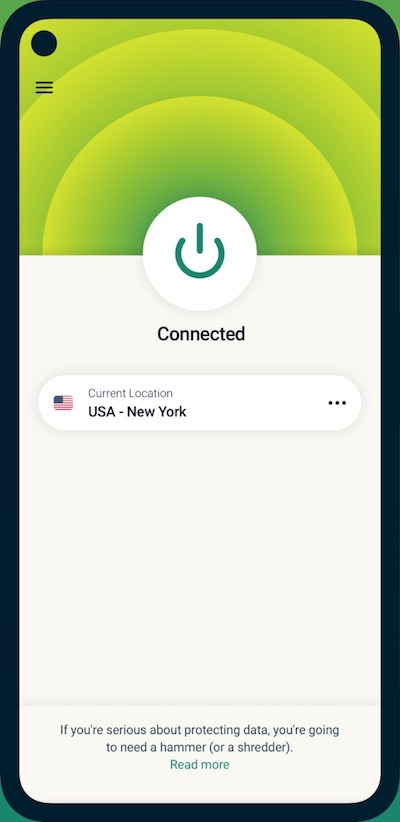
With ExpressVPN apps, you get important security features like their Network Lock kill switch and their private DNS service that keeps your ISP from spying on you.
It also includes Threat Manager, a feature that stops apps from tracking you. Threat Manager has a list of third parties known to be malicious, and uses that list to prevent any apps from communicating with those third parties.
Another feature that you could find useful is their split tunneling option. With it, you can route the traffic for some apps through the VPN, and others over your regular internet connection.
ExpressVPN provides you with eight simultaneous connections. Unlike TunnelBear, ExpressVPN has excellent customer support. You can access 24/7 live chat support whenever you need it, or check out a large selection of instructional videos on their website.
We've already seen the effect of the new Lightway protocol during our speed testing. With Lightway, ExpressVPN blows away TunnelBear.
Note: While Lightway improves the performance of ExpressVPN, you can see in our ExpressVPN vs NordVPN Comparison that NordVPN is even faster with the WireGuard protocol.
Both of these services focus more on ease of use than on piling on the advanced features. But ExpressVPN's split-tunneling feature, Threat Manager, browser extensions, and new Lightway protocol make it the winner.
Features winner: ExpressVPN
ExpressVPN and TunnelBear speed tests
A VPN can slow down your internet connection. But how much they slow you down varies. Some VPNs are fast; some are slow. A slow VPN means a slow internet connection, and a slow internet connection stinks.
We tested both ExpressVPN and TunnelBear on our 500 Mbps internet connection from our US lab.
Note: The best way to see how fast a VPN will be in your particular situation is to buy it and run it for yourself. But that can be a huge headache, so we do it for you. Your results may not be identical to ours, but you'll be able to get an idea of which VPN is likely to be the fastest.
For these tests, we ran ExpressVPN with their new Lightway VPN protocol activated. Lightway is an ExpressVPN proprietary protocol that is designed to be faster and more secure than the OpenVPN protocol used by TunnelBear and most other VPNs.
United States servers
We ran into a minor snag right off the bat. The TunnelBear VPN server network is tiny with only one server location in each of the countries they support. This is in contrast to ExpressVPN, which has 160 server locations in 94 countries. As you might expect, most of those ‘extra' server locations go to the countries that you are most likely to want to visit.
For example, ExpressVPN has 23 server locations in the United States alone. Meanwhile, TunnelBear has only one US server location. So in these results, you will see us comparing an ExpressVPN server location in say, Seattle, to the TunnelBear server location identified only as “United States” (no city selection available).
Here are the test results for the TunnelBear server in the US: 52 Mbps.
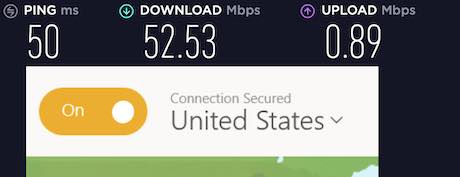
This is really slow. Remember that we ran this test using a 500 Mbps connection. That means it takes almost nine times as long to download something when TunnelBear VPN is active.
Let's see how ExpressVPN did. We used the Los Angeles server location, which had about the same latency (ping) as we had for TunnelBear. With ExpressVPN's LA server we got 209 Mbps.

With the US server location, ExpressVPN was about 157 Mbps faster than TunnelBear — a very large margin. And while this is not as fast as the speed tests we got in our NordVPN review, it is still pretty decent.
Now let's look at servers in the UK.
United Kingdom servers
A lot of great streaming content comes out of the UK. For example, many people need a VPN for BBC iPlayer streaming. There are also many UK users who need a good VPN for privacy reasons, of course. So let's see how ExpressVPN and TunnelBear compare with this region.
Here are the results for TunnelBear using the company's only UK server: 5 Mbps.

As you can see in the image above, that was not a typo. Running on a 500 Mbps connection, the Bear was only able to deliver 5 Mbps of data to its users. That is truly horrible.
Here are the results when we connected ExpressVPN to one of their UK server locations: 235 Mbps.

Again we see that ExpressVPN is much faster than TunnelBear with the UK server location. With ExpressVPN active, we got almost 50% of the bandwidth of our test connection, as opposed to 1% of the bandwidth when using TunnelBear.
ExpressVPN is the big winner if you need a UK VPN that delivers fast speeds.
Neither ExpressVPN nor TunnelBear support the WireGuard VPN protocol. WireGuard offers very fast speeds and near-instant connections. We already see it being used by a handful of VPN services, as we noted in our CyberGhost vs NordVPN comparison.
Speed test winner: ExpressVPN
Note: ExpressVPN also came out on top in our tests for the ExpressVPN vs IPVanish comparison.
Streaming and torrenting comparison
Aside from privacy and security, many people are using VPNs for streaming and torrenting. Let's compare ExpressVPN and the TunnelBear VPN on these two important capabilities.
Streaming
TunnelBear does not work well for streaming. We tested it out and quickly learned that TunnelBear does not work with Netflix. When we tried to connect to Netflix through TunnelBear's US server location, we got this error message:
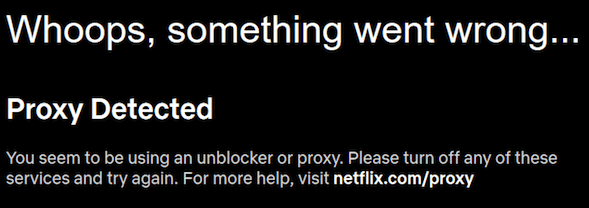
Aside from getting blocked by Netflix, there are two other problems when trying to use TunnelBear for streaming:
- Very few server locations: This means you will not have any other options if you run into problems.
- Slow speeds: Do you want to stream HD-quality video without buffering and interruptions? TunnelBear's slow network speeds may prevent you from doing that.
Overall, we see that TunnelBear is definitely not the best VPN for streaming. So now let's take a look at ExpressVPN.
ExpressVPN is an excellent streaming VPN. Our tests confirmed that it's consistently fast and can unblock most streaming services, including US Netflix (with many regional libraries). It is also a great VPN for Hulu, Disney Plus, and more. Below we are streaming US Netflix using an ExpressVPN server in Washington DC:
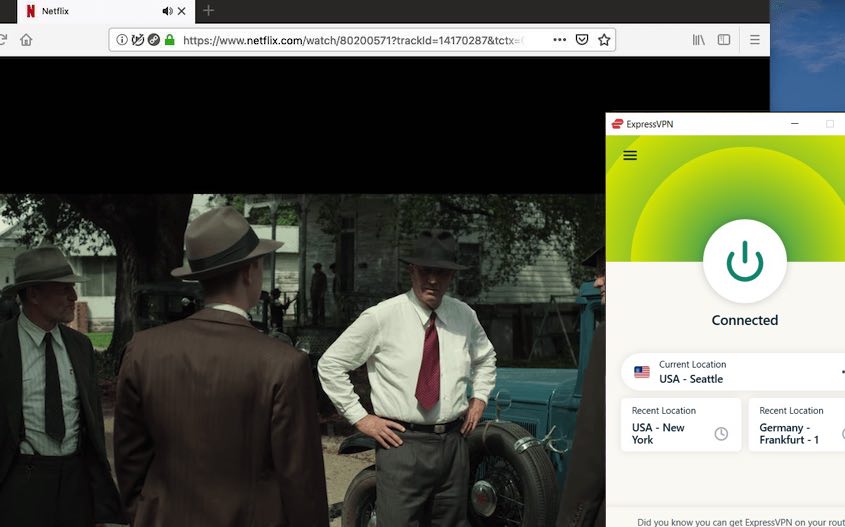
And because ExpressVPN has so many server locations around the world, even if a particular location stops working for some reason, you'll likely be able to connect using one of the other locations nearby. We rated it as one of the top VPNs for Netflix.
Streaming winner: ExpressVPN
Torrenting with ExpressVPN and TunnelBear
Since most people who use a VPN for torrenting are sharing movies or music, they need a VPN that is fast and extremely secure. Being located in a privacy-friendly jurisdiction wouldn't hurt either.
ExpressVPN is a good VPN for torrenting. It is fast, secure, and located in a safe privacy jurisdiction.
TunnelBear is not a good VPN for torrenting. While this service is secure, it is very slow. Also concerning is that it is based in a bad jurisdiction for privacy. ExpressVPN is clearly a better option for torrenting.
Torrenting winner: ExpressVPN
When it comes to streaming and torrenting, there is no contest.
Streaming and Torrenting winner: ExpressVPN
Encryption, VPN protocols, and security
ExpressVPN is really running away with this so far. Can TunnelBear make up some ground in this category?
Encryption and VPN protocols
The use of strong encryption algorithms is vital to VPN security. As you are about to see, the encryption can vary depending on the VPN protocol being used.
Apps that don't leak are also vital since it doesn't matter how good your encryption is if the VPN apps occasionally dump unencrypted traffic onto the internet, exposing your identity to third parties.
TunnelBear uses the following VPN protocols and encryption algorithms: OpenVPN and IKEv2 VPN protocols with AES-256 ciphers that have 2048, 3072, or 4096-bit DH keys. These VPN protocols are industry standards and the encryption algorithms are strong.
Their apps and VigilantBear leak protection system didn't display any leaks or other problems in our VPN tests.
ExpressVPN uses the following VPN protocols and encryption algorithms: with OpenVPN and IKEv2 protocols, it uses an AES-256 cipher with an RSA-4096 key and SHA-512 HMAC authentication. With the Lightway protocol, it uses AES-256-GCM and ChaCha20/Poly1305 ciphers, and D/TLS 1.2 for server authentication.
The ExpressVPN apps incorporate excellent encryption with strong leak protection settings. We did not find any leaks or security issues with anything.
We can see here that ExpressVPN supports all of the same VPN protocols as TunnelBear, in addition to their self-developed Lightway protocol, which delivers faster speeds and upgraded security.
TunnelBear's team did fine in this category. If they supported an advanced VPN protocol like Lightway or WireGuard, we would have called this one a tie.
Encryption and VPN protocols winner: ExpressVPN
Note: There are a few VPNs that now offer double-VPN encryption utilizing two servers at the same time. We compare VPNs that offer this feature in our NordVPN vs ProtonVPN report.
Security audits
While most VPN services claim to have great security (and be super fast), many of them are not entirely honest. Fortunately, a few have undergone audits that actually back up VPN marketing claims. These audits help by providing independent confirmation that a VPN's security claims are valid.
ExpressVPN underwent a security audit of their browser extensions in 2018. Cure53 conducted this audit and found a few issues that were quickly corrected by company engineers. As noted in the ExpressVPN blog,
In its investigation, Cure53 identified eight issues, none of which received a severity level higher than “medium.” Cure53 states that “quite clearly, this is a good security indicator.”
In addition to the security audits, ExpressVPN has also undergone two separate audits that confirmed the no-logs VPN claims. And ExpressVPN continues to conduct third-party audits of all elements of the service.
TunnelBear has also completed a number of security audits over the years. The most recent audit occurred at the end of 2021, and was conducted by Cure53. While this audit found a number of problems, including three critical-risk vulnerabilities, the TunnelBear team was able to quickly resolve all of them.
TunnelBear does a better job of keeping their systems audited than the vast majority of VPN services. Unfortunately, ExpressVPN is one of the few services that does an even better job of keeping their systems audited.
Security audits winner: ExpressVPN
Server security
While every VPN service takes steps to protect their VPNs from online attacks, that's not the only way to get access to a VPN server. The best VPNs protect their servers from physical assaults as well.
ExpressVPN knows full well that physical servers are at risk. In 2017, Turkish forces seized an ExpressVPN server to search for information about a user of the service. While there was no useful information available on the server, ExpressVPN decided to go further.
Now, every VPN server in ExpressVPN's network is diskless. That means it is physically impossible for any user data to be stored on a server. With everything stored in volatile RAM, the instant that a server loses power (such as when some soldier tries to physically remove the server), any data that it contains disappears.
They refer to this as the TrustedServer feature. This is arguably the most secure way to run a network, with companies like NordVPN and Surfshark following in ExpressVPN's footsteps.
TunnelBear doesn't make mention of any special steps they take to provide server security.
Server security winner: ExpressVPN
Security and encryption overall winner: ExpressVPN
ExpressVPN and TunnelBear Privacy
Protecting your privacy is what VPNs are all about, so you would assume that all VPNs do it well. Unfortunately, that is an unsafe assumption, making this privacy analysis of our two contenders mandatory. As one example, the “no logs” IPVanish was found to be logging users for the FBI. We also found another VPN to have done the same, as we covered in our PureVPN review.
ExpressVPN privacy considerations
ExpressVPN rates well across the board when it comes to privacy. Specifically:
- An audited no-logs policy. In June 2019, PwC (PricewaterhouseCoopers conducted an audit of the ExpressVPN no-logs policy and privacy protection measures, confirming that these work as advertised. They checked again in June 2020.
- A privacy-friendly jurisdiction. The BVI is one of the best privacy jurisdictions in the world.
- RAM-disk servers ensure that no user data can be stored on any server in the ExpressVPN network.
TunnelBear privacy problems
As we explained in the TunnelBear review, these guys don't do as well on the privacy front. We've already covered the issues with Canada as a jurisdiction, but there are also problems with the TunnelBear logging policy. TunnelBear claims to have a “no logs” policy — but there are some red flags. That's because their privacy policy lists several items that they do log. Here is how TunnelBear is logging your data:
- Your operating system version
- TunnelBear VPN app version
- If you used the TunnelBear VPN network this month
- How much of their bandwidth you use each month
These activity logs aren't horribly dangerous to your privacy, but they are a contradiction of their “no logs” claims. Once again, they say one thing and do something else. Can you really trust them?
Another difference here is that TunnelBear has not undergone a no-logs audit like ExpressVPN.
Privacy winner: ExpressVPN
Prices and refunds: TunnelBear vs ExpressVPN
With ExpressVPN winning virtually everything so far in this comparison, you can see how this is going to turn out, so we'll wrap up quickly. But this is a category where the battle might tip toward the big Bear.
ExpressVPN offers 3 price plans. If you use the coupon below, the cheapest rate comes at $4.99 per month for the 2-year plan, and it comes with four months free. Below are the prices with the four months free coupon:

This is on the higher end of the price spectrum. It's clear that ExpressVPN is not the cheapest VPN you will find.
Refunds: All ExpressVPN plans include a 30-day money-back guarantee.
TunnelBear also offers 3 price plans: their limited Free plan that is good for testing the service, an Unlimited plan priced from $3.33 per month (renewing at $59.88 per year), and a Teams plan, running $5.75 per month per user.

TunnelBear pricing is generally lower than ExpressVPN pricing. However, where ExpressVPN offers 30-day money-back guarantees with all their plans, TunnelBear does not offer any refunds. It is one of the very few VPN services with such a policy, and tips the scales against them in this category. This may be due to the fact that TunnelBear offers a limited free VPN service with 500 MB of data.
TunnelBear has lower prices, but ExpressVPN has a superior refund policy. Call this one a tie.
Prices and refunds winner: Tie
Is TunnelBear or ExpressVPN the best value?
The value a VPN offers depends on more than its price. If a VPN doesn't do what you need it to (unblock Netflix, for example) it is a bad value no matter what its price is. Likewise, if the price is right, and the features are right, but you don't trust the company's policy on logging user data, it is a bad value.
ExpressVPN does everything well. It is fast, reliable, and does everything you would ask for from a VPN. It is backed by a strong organization based in a pro-privacy jurisdiction.
TunnelBear is really slow, sometimes it doesn't connect, we have questions about their “no-logs” status, and they are based in a privacy-hostile location. It also has a tiny server network and gets blocked by streaming services and various websites.
Regardless of price, which VPN service offers the better value? We'll take ExpressVPN here any day of the week.
Value winner: ExpressVPN
Conclusion: ExpressVPN wins in 2025
By this point, we're sure the winner of this battle between TunnelBear and ExpressVPN is no surprise. So let's do a quick summary of our eight test categories and call it a day:
- Company background and jurisdiction: ExpressVPN
- Speed tests: ExpressVPN
- Features: ExpressVPN
- Streaming and Torrenting: ExpressVPN
- Encryption, VPN protocols, and security: ExpressVPN
- Privacy: ExpressVPN
- Price and Refund: Tie
- Value: ExpressVPN
Given what we uncovered in our testing, we advise you to avoid TunnelBear altogether.
ExpressVPN is a far better product and is one of our top-rated VPNs. Even better, you can get a nice discount on an ExpressVPN subscription if you use the coupon below.
ExpressVPN Coupon:
Sign up for the 2-year plan and get 4 months added to your subscription for free.
(Coupon is applied automatically.)
Related Articles:
If you have used either ExpressVPN or TunnelBear, feel free to share your honest review below in the comments.
This comparison of ExpressVPN and TunnelBear was last updated on February 12, 2025.

Leave a Reply